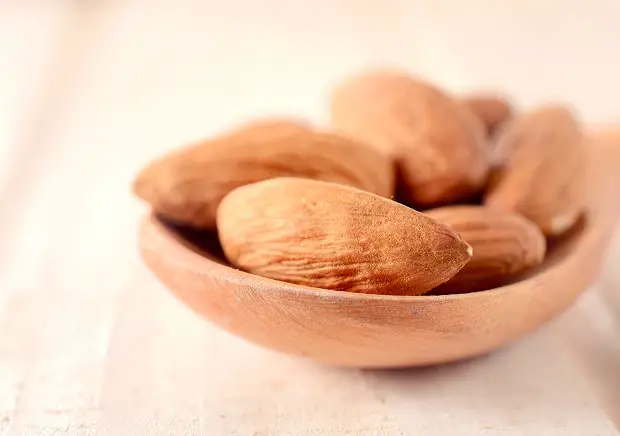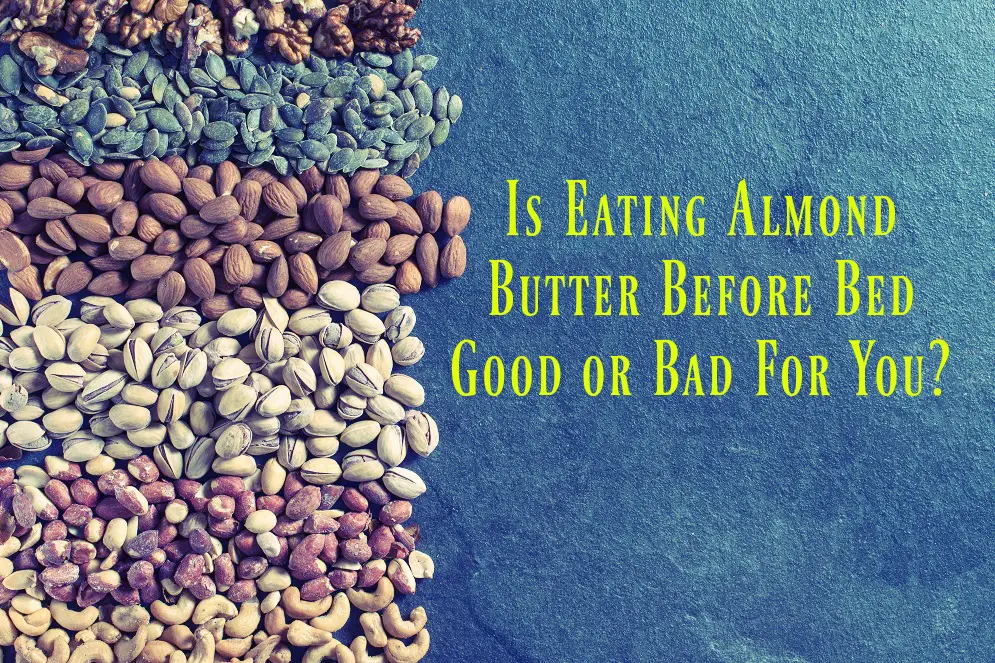Sleep deprivation is a serious problem, and one that occurs far too often.
More and more articles are claiming that food like almond butter before bed can help you sleep better and wake up feeling more well-rested.
But is eating almond butter before going to bed really good for you?
Can it help promote sleep? We’re here with the almond butter facts.
Is Eating Before Bed Good or Bad?

General wisdom says that it’s bad to eat too soon before bed.
And that’s certainly true if your pre-bed snack is something processed or high in sodium, simple carbs, or something else equally unhealthy!
However, multiple studies have given conflicting results, especially when it comes to weight gain and weight loss.
To dispel a generally-accepted myth, your metabolic rate doesn’t slow down when you sleep, so you don’t need to worry about the calories from your midnight snack burning more slowly than they would during the day.(1)
But, eating before bed has still been linked with higher caloric consumption, higher BMI, and weight gain. (2,3,4)
All of these seem to be due to psychological triggers and eating patterns, rather than any inherent physiological reason.
This is coupled by the fact that, for some, eating before bed may help curb the appetite and promote weight loss by satisfying hunger with a healthy snack or helping prevent hunger the next morning. (5,6)
As well, eating something sustaining before bed will (obviously) help you from being woken up with hunger pangs during the night.
In summary?
You know yourself best.
Almond butter is a great pre-bed snack that’ll help you stay full during the night, but if you know that you need to avoid eating before bed, then don’t worry about it.
Does Almond Butter Help With Blood Sugar?
The website Mind Body Green gives a slew of reasons for why almond butter might be a great snack before bed.(7)
They get a few things right – almond butter is full of healthy fats and is a significant source of protein, at 13g on average for 2 tbsp.
Proteins and fats help you feel fuller, longer, as do things like fiber, which almond butter also provides. They’re also slower to digest than carbohydrates and sugars, which means you’ll be getting energy from them at a lower but steadier rate.
They rate low on the glycemic load index for this very reason – they don’t cause blood sugar to spike!
However, if you’re worried about your blood sugar being low when you wake up in the morning, you might need to speak with a doctor, as it may imply that you have type 1 diabetes.
A dip in glucose levels at night triggers the brain into making hormones that help regulate them, including adrenaline and cortisol – which will definitely wake you up.
And a severe dip in glucose levels can have plenty of effects on your sleep, too.
Conversely, a healthy adult on a steady sleep schedule will experience a surge of blood sugar levels between 4 and 8 am to help prepare for waking up.(8)
This triggers an increase in the absorption of insulin by muscle, fat, and liver cells, meaning that for those who are healthy, there shouldn’t be much of any change in blood sugar levels first thing in the morning.
According to the Alaska Sleep Education Center, if you’re having troubles with blood sugar throughout the night, not only should you speak with a doctor, but it’s better to stick with whole grains and other complex carbs.(9)
Not only do they keep your blood sugar levels steady, they also may help increase serotonin in the brain.
Magnesium in Almond Butter and Better Sleep?

US News states that magnesium in your diet helps you sleep and helps your muscles relax.(10)
And this is true!
According to James F. Balch, M.D., a deficiency in calcium or magnesium will mean that you’re waking up just a few hours into sleep.(11)
Conversely, a high-magnesium and low-aluminum diet means you’ll be much better rested with deeper sleep.
Magnesium deficiencies, specifically, lead to hand and foot spasms, larynx spasms, and muscle twitches.
It’s also true that almonds are a significant source of magnesium, as are bananas, tofu, avocados, and legumes.
Eating a serving of food with magnesium in it isn’t going to work like a sleeping pill; if you’re having trouble staying asleep, magnesium and calcium deficiency might be the culprit, but the best solution for your body is eating a balanced diet that naturally includes magnesium-rich foods.
Eating a banana with your breakfast, leafy greens with your lunch, tofu with your dinner, whole grains throughout, and dark chocolate for dessert will get you all the magnesium you need and lead to far better sleep than a tablespoon of almond butter just before bed!
It’s important to note, as well, that a single serving of almond butter (2 tbsp) only has about 22% of your daily magnesium requirement, according to a USDA study. (12)
So if you’re planning on using almonds as your only source of magnesium in your day, it’s better to stick with whole almonds.
However, if you’re just looking to pad out a rough day, adding a tablespoon or two of almond butter into your daily routine might be a great way to go.
Research says…
If you’re looking for a bedtime snack, go ahead and grab some almond butter!
It’s healthy, tasty, and it might even help you stay full throughout the night.
But, if you’re having sleep problems, almond butter isn’t a miracle pill. The best way to make sure you’re getting enough good quality sleep involves changing your daily habits.
Make sure you’re setting yourself a regular sleep schedule (even when you have a day off), eating a balanced diet high in magnesium and calcium, and exercising during the day.
That – and a reduction in caffeine and stress – will have you happily snoozing straight through the night.
Resources
(1)https://www.ncbi.nlm.nih.gov/pubmed/3378547
(2)https://www.ncbi.nlm.nih.gov/pubmed/25439026
(3)https://www.ncbi.nlm.nih.gov/pubmed/23036285
(4)https://www.ncbi.nlm.nih.gov/pubmed/23814334
(5)https://www.ncbi.nlm.nih.gov/pubmed/15310735
(6)https://www.ncbi.nlm.nih.gov/pubmed/24833598
(7)https://www.mindbodygreen.com/0-25637/a-doctors-top-5-foods-for-better-sleep-including-almond-butter.html
(8)https://www.webmd.com/diabetes/sleep-affects-blood-sugar#1
(9)http://www.alaskasleep.com/blog/blood-sugar-and-sleep-problems
(10)https://health.usnews.com/health-news/articles/2012/07/19/sleep-promoting-and-sleep-stealing-foods
(11)https://www.medicalnewstoday.com/releases/163169.php
(12)https://www.ars.usda.gov/ARSUserFiles/80400525/Articles/ADA10_SunflowerAlmondButter.pdf
Leave Feedback: Was this article helpful?

